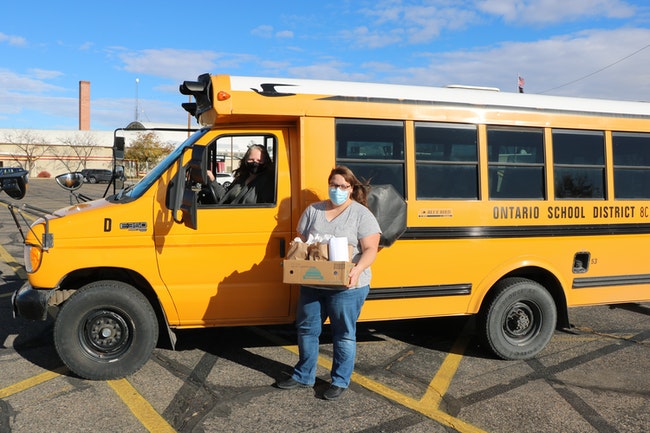
Jeannine Wyborney and Kelly Gekeler, instructors in the Early Head Start classroom, stands with the school lunches and the bus they use to deliver to the teen moms and their children.
ONTARIO – Gabriella Cordero, 18, has a reputation with her teachers and mentors as a hard worker.
When the recent graduate of Quest Academy in Ontario isn’t at her job as an instructional assistant at May Roberts Elementary School in Ontario, she’s working as a certified nursing assistant in a care facility.
“I talk to a lot of people and they’re like, ‘Wow, you are so mature for your age! You know so much about everything, and you wouldn’t think you were 18,’” said Cordero. “But sometimes they wouldn’t know when they said that that I have a 3-year-old daughter.”
Cordero became pregnant with her daughter Luna during the second semester of her sophomore year at Ontario High School. She is one of a disproportionately large share of Malheur County residents to experience pregnancy and birth before reaching adulthood.
Recent data from the 2020 Community Health Needs Assessment done by Saint Alphonsus Medical Center showed Malheur County with a teen birth rate of 46.2 per 100,000 people, outstripping averages both in neighboring counties and statewide. The issue is concentrated in Ontario.
But for eight years now, Ontario High School has committed to giving its parenting students the extra support they need through an initiative called the Ontario Teen Parent Program – Early Head Start. The program serves any parent at Ontario High School who wants to opt in, but the majority of those who take part tend to be mothers. The mothers and fathers are moved to an alternative classroom at Quest Academy, hosted at Ontario First Church of the Nazarene.
Just down the hall from the parents’ classroom is the Early Head Start classroom, where the babies receive care from a team of district teachers and staff from the Oregon Child Development Coalition. This model allows parents to attend classes while having the time throughout the day to be with their baby.
The goal of the program, said head teacher Connie Limbaugh, is to shepherd students through high school graduation and on to college and the job market.
“We spend a lot of time with juniors and seniors talking about college, giving them time to fill out the FAFSA, and time to do some career exploration, and time to apply to college, and time to fret about it and answer their questions,” said Limbaugh. “We just support them through all areas.”
For some teen parents, the more pressing need is to get a job to support their child. The program also allows participants to take part in Treasure Valley Tech classes like welding, and certification classes like the nursing course that Cordero completed.
Such classes make graduates “readily employable,” said Melissa Judson, assistant high school principal and a supervisor of the program.
Judson declined to provide comprehensive statistics about the program’s matriculation rate, citing privacy concerns due to its small class size. Limbaugh’s class is capped at six seats.
Limbaugh told the Enterprise that in her six years as head teacher, she’s had three mothers drop out.
“My heart breaks because I have lost some girls. I feel as if I have failed them,” said Limbaugh. “But that’s my own internalization of wanting to save the world, and I can’t.”
Not that you would know that, listening to Cordero talk about her.
Limbaugh and her colleagues at the Early Head Start classroom, according to Cordero, are “the best people to do the job they’re doing.”
“They could honestly help anyone,” said Cordero. “And they just happen to do it with teen moms who need the help a lot.”
 Gabriella Cordero and her daughter Luna at Cordero’s high school graduation. Luna clasps her mother’s prized high school diploma.
Gabriella Cordero and her daughter Luna at Cordero’s high school graduation. Luna clasps her mother’s prized high school diploma.
Adjusting to the pandemic
Before the Covid pandemic, Quest Academy’s learning was largely online already. The teen parents and their classmates study using a program called Edgenuity, which takes them through course material on the computer. Still, Limbaugh described the sense of loss she’s experienced as the pandemic has prevented her from working with her students in person.
“I used to just look at them and go, ‘It looks like you’re stuck. Do you need help?” said Limbaugh. “Or I could walk by and say, ‘Wow, you’re really zooming on this. This is awesome, do you need anything?”
“Sometimes with my moms, I would say, ‘You look so tired. Do you want to put your head down and take a nap? Do you need to go down to the EHS classroom and sit in the chair and hold your baby and fall asleep for a little while?’” she continued. “Because I was a mom, and I was out of college and I still felt exhausted and at my wits’ end sometimes, so I extend to them the same things that I would’ve liked extended to me.”
Cordero remembers that empathy with gratitude.
“That’s something that really helped me, because if I had to go through the day tired, I wasn’t going to get much done,” she said. “But if I got a nap in, I could get a lot more done in a shorter amount of time.”
“Honestly, there’s not many people that would let you do that,” she added.
Unfortunately, with distance learning, Limbaugh doesn’t often get the chance for such help. She’s had to find new ways of connecting with her students. Part of that strategy involves making time to see her students face-to-face – outside, socially distanced, and with masks. Since Malheur County’s high rate of Covid means that her students can’t come to her, she goes to them.
“That woman is doing it all, and then at the end of the day she goes and does home visits,” said Judson. “And if there’s not somebody else to go with her to make sure she’s in a pair of two for home visits, she rounds up her husband and he goes with her to make sure that she stays safe while she’s out there making sure her students are getting what they need.”
Limbaugh isn’t the only teacher in the Ontario Teen Parent Program to visit students. When staff realized that the teen parents and their children were missing the free meals provided earlier by the school district and the Oregon Child Development Coalition, Early Head Start teachers Jeannine Wyborney and Kelly Gekeler acted. Soon, Darrell Wilson, the transportation supervisor at the Ontario School District, had trained the two to operate a small school bus, and Pam Suyematsu, the district’s director of nutrition services, obtained meals through a federal food program.
Now, Wyborney and Gekeler make daily deliveries of food and activity kits to every family in the program during the school week. Cori Grimaldo, the lead teacher from the Oregon Child Development Coalition in the Early Head Start classroom, often accompanies them.
 The activity kits provided by the Ontario Teen Parent Program – Early Head Start include crafting materials to make a letter of the day and an activity which helps the babies practice their fine motor skills. Here, the letter is F, for frog, and the babies can practice putting cheerios in the frog’s mouth.
The activity kits provided by the Ontario Teen Parent Program – Early Head Start include crafting materials to make a letter of the day and an activity which helps the babies practice their fine motor skills. Here, the letter is F, for frog, and the babies can practice putting cheerios in the frog’s mouth.
“We’ve been very grateful that the school district has afforded us this resource because it’s a pretty big deal to let us use a bus,” said Wyborney. “That shows how supportive the district has been of what we’re trying to accomplish. For this program to work, it takes all departments within the Ontario School District, the school board, OCDC, and community agencies.”
A good team
As staff reflected on the impact of Ontario Teen Parent Program, it became clear how committed they are not just to the program, but to one another.
“We have a really good team, and I’m so thankful to work with everyone that we have,” said Grimaldo.
“It definitely takes all of us,” said Lisa Dickard, the family advocate from the Oregon Child Development Coalition.
“One word that I can use to describe the feeling that this program gives to anyone who is fortunate enough to experience is ‘joy,’” said Judson.
“We celebrate every accomplishment: big accomplishment, little accomplishment,” said Limbaugh. “New front teeth, learning to walk, passing a quiz, passing a test, writing an essay – all those things are celebrated.”
“We’re teaching two generations at a time here,” said Wyborney. “We’re teaching the teen parents and working with their infants and toddlers on giving them a really strong foundation for their education. We’re very intentional with child development and modeling that to the parents in hopes that they continue that at home. We’re hoping to set the little kids up to do really well when they start school.”
“It’s a big change for many people, being a teen mom and trying to get your education,” said Cordero. “But if there’s one place where teen moms would do best at finishing their education it would be Quest Academy.”
News tip? Contact reporter Liliana Frankel at [email protected] or 267-981-5577.
GET YOUR LOCAL NEWS FROM REAL PROFESSIONALS: Reader support allows the Enterprise to provide in-depth, accurate reporting that otherwise would not get done. Keeping the community well informed is essential. SUBSCRIBE – $5 a month, automatically. DONATE – to provide additional support.




